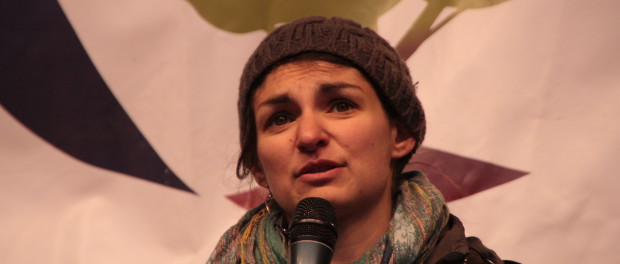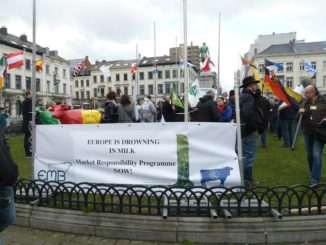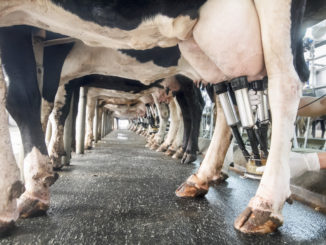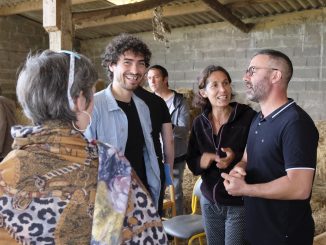Continuing with our #MilkCrisis debate series, this interview with Aurélie Trouvé, agricultural economist, focuses on the voluntary market control measures announced in March. Trouvé also uses this interview to deal with broader issues of voluntary vs compulsory measures, EU dairy in a global context, and the various solutions on offer from others.

Read the ARC2020 #MilkCrisis debate
This interview with Aurélie Trouvé, French agricultural economist, focuses on dairy market management mechanisms activated in March. These allowed for further voluntary market control measures. Chief among the mechanisms was the application of “voluntary supply management” or Article 222: In a statement the Commission said that “producer organisations, interbranch organisations and cooperatives in the dairy sector” can “establish voluntary agreements on their production and supply.” This is also described as a temporary measure. Trouvé also uses this interview to deal with broader issues of voluntary vs compulsory measures, EU dairy in a global context, and the solutions offered by others such as Alan Matthews.
ARC2020: What is your general thinking on the efficiency of article 222?
This proposal is not sufficient – interesting but not sufficient. It is only voluntary, only implemented by some member states, or regional producers organisations, so it won’t influence the EU prices, especially not when other countries will increase their production. It will be decided only at local or national level, so won’t affect price at EU level. It’s not a solution for stabilising prices – which means reducing volume – so the council of Ministers should look at the other French proposal made in February.
This other French proposal is not based on 222 – but 221, which allows many measures in case of crisis. 1st proposal here is that in case of crisis we have an obligation for reducing production for all milk collectors in the EU; if this is not done in several months, then you have penalties and an obligation for reducing production with penalties big enough to encourage the reduction.
Another French proposal made in February 2015 is to give subsidies to producers who reduce production compared to the last period – for example, 100 euros per thousand litres of milk not produced. The budget for these subsidies could be controlled and limited. And one producer could not be subsidized for more than one given volume, so the issue of sustaining of producers who want to stop anyway is avoided.
These 2 proposals – especially the 1st one – could be much more efficient than the one decided in March.
ARC2020: What do you make of the arguments made by some, that EU wide reductions would put the EU at a competitive disadvantage with the rest of the world?
Europe is one of the world’s largest producers, what we decide has an important impact on the world level. We were the first region in the world that brought more volumes towards exports markets over the two last years. And we export more and more milk products, without importing more. Now we have a responsibility to, as it were, ‘clean’, or to stabilize world markets thanks to our regulation of volumes.
Moreover we still have good levels of protection against imports of milk products – if we do not sign more free trade agreements – so I think that the risk of increased imports is not so high.
ARC2020: Commentators such as Alan Matthews have suggested various solutions to the current crisis. These include changes in tax, in insurance, in loans, in interest. Dairy futures investments have also been suggested. So the question is – do you agree with these? Are there others that could be considered?
There is now a structural crisis of overproduction, the only solution is regulating volumes at EU level – its essential. And proposals from Alan Matthews don’t reduce or regulate volumes at EU level. They also face some specific difficulties in EU: for example in US, these options can work better because there is more transparency of markets data available. However, even in US, they do not replace other strong tools for regulating prices. For example, in the US the payment of milk products by industry, according to their sales and their added value, is made into what they call federal MMOs (Milk Market Orders). Then, this is redistributed between producers, so that each one can receive the same price.
In this context of very unstable prices, we should develop regulation tools which help farmers to make reserves in case of crisis. One solution is developing “mutual funds” (some of a reserve financed by professionals and used in case of revenues fall), sustained by public funds. This measure already exists under the 2nd pillar of the CAP, but modalities should be reviewed, for more efficiency. Then, this has to be accompanied by tools for regulating volumes and/or prices: we can’t have efficient mutual funds at local, national or EU level, if the crisis runs for several years, as the reserve would be quickly empty.
Moreover, the EU reserve crisis is around 400 million per year for the entire EU and for the entire agricultural production – the problem is that after one year this reserve is empty. It’s financed by one small part of subsidies, which are given again to farmers at the end of each year if it is not used. So we don’t have a reserve which is sufficient for answering the crisis. What could be efficient would be to have a “cumulative” reserve – so at the end of the year the money is not given again to farmers.
ARC2020: What about another solution, which is reducing the fiscal charges of producers ?
For me, this means fiscal dumping in each member state : if everyone reduces taxes on farmers in each European country, it won’t have any real effect, but will only work for the one that decreases the taxes the most, in order to export to other EU countries – as most of the exports go to the other EU countries. And obviously it won’t answer the problem of overproduction.
ARC2020: What about increasing the level of minimal prices guaranteed for producers (and public storage) ?
This is a demand from France and more and more EU countries. Yes of course it could answer the difficulties of farm revenues, it could stabilize prices and so on. However… in 1984 we decided on quotas, to reduce excessive storage. They are now abolished. If we do not have sufficient tools for reducing volumes at EU level, storage will again increase and we’ll have export subsidies like before.
The EU won’t fall back on the local stage with production controls. Progress in the sector is not simply to produce more – we have global overproduction remember. The Chinese want imports, sure, but they are certainly facing into a long decrease in growth. They also want to increase their own production, so they decreased their imports last year. All the growth models from EU Commission and others, which fail to take this and other factors into account, are false –demand won’t increase in the next 20 years as it was foreseen.
So it’s not just about producing more milk, it’s about producing for a good price, with lower costs of production, and in the same time it’s about answering societal demands, for protecting environment and employment particularly. How could we answer all of these requirements? One possibility is decreasing the cost of production using agroecological methods.
For example, extending the grazing season, good management of grass, use of clover, perhaps more subsidies and measures which allow these kinds of production systems to flourish. We must also further invest in organic dairy’ research as it’s also where consumer demand is growing.
ARC2020: Could you expand upon this agroecology point?
Eg we have to develop systems of mixing crops and animals on the same farm, which allows complementary interactions between cows and crops; this involves organic fertilization (farm yard manure) and your own grass, and crops for feeding. These methods can decrease the cost of production and can result in good yields. We have some experiments with farmers getting great grass yields using agroecology, which shows that in west of France, for example, we can have economically and social sustainable agroecological systems. These have to be underpinned by the public purse, in the sense that these are the areas investments and supports should be put. All these kinds of production are studied and sustained in some producers’ networks (e.g. CIVAM in France) and research, using for example the term of “autonomous” and “economical” agricultures.
Aurélie Trouvé is Senior Lecturer in Economics AgroParisTech, former co-president of Attac (2006-2012) and author of “Le business est dans le pré (2015)”
More
Measures Against Market Imbalance in the Dairy Sector (Trouvé & al.)
Milk Crisis debate (full)
Opening article (part 1)
Alan Matthews (part 2)
EMB ( part 3)





